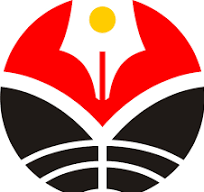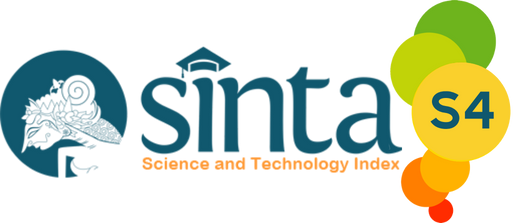Pengaruh Mata Kuliah Teknologi Pengolahan Limbah terhadap Kemampuan Sustainability Literacy Mahasiswa Pendidikan Teknologi Agroindustri
Abstract
Keywords
References
Akeel, U., Bell, S., & Mitchell, J. E. (2019). Assessing the sustainability literacy of the Nigerian engineering community. Journal of Cleaner Production, 212, 666-676. doi: https://doi.org/10.1016/j.jclepro.2018.12.089
Albinsson, P. A., Burman, B., Shows, G. D., & Stoddard, J. E. (2020). Integrating and assessing student perceived sustainability literacy in an Integrated Marketing Communications course. Marketing Education Review, 30(3), 159-176. doi: https://doi.org/10.1080/10528008.2020.1770102
Benneworth, P., Kolster, R., Stienstra, M., Garcia, L. F., & Jongbloed, B. (2020). Integrating Sustainable Development into the Curriculum: Enacting "Scalar Shifting" in ESD Competencies. Integrating Sustainable Development into the Curriculum, 18, 145-161. doi: https://doi.org/10.1108/S2055-364120200000018027
Berchin, I. I., de Aguiar Dutra, A. R., & Guerra, J. B. S. O. D. A. (2021). How do higher education institutions promote sustainable development? A literature review. Sustainable Development, 29(6), 1204-1222. doi: https://doi.org/10.1002/sd.2219
Berticelli, R., Pandolfo, A., Reichert, G. A., Salazar, R. F. D. S., & Kalil, R. M. (2020). Support system for decision-making processes related to municipal solid waste management by taking into consideration a sustainable life cycle assessment: review on environmental, economic and social aspects. International Journal of Environment and Waste Management, 26(2), 147-167. doi: https://doi.org/10.1504/IJEWM.2020.108812
Boarin, P., Martinez-Molina, A., & Juan-Ferruses, I. (2020). Understanding students’ perception of sustainability in architecture education: A comparison among universities in three different continents. Journal of Cleaner Production, 248, 119237. doi: https://doi.org/10.1016/j.jclepro.2019.119237
Bramwell-Lalor, S. (2019). Assessment for Learning on Sustainable Development. In Encyclopedia of Sustainability in Higher Education, 57-65. Springer International Publishing. doi: https://doi.org/10.1007/978-3-030-11352-0_1
Caeiro, S., Sandoval Hamón, L. A., Martins, R., & Bayas Aldaz, C. E. (2020). Sustainability assessment and benchmarking in higher education institutions—A critical reflection. Sustainability, 12(2), 543. doi: https://doi.org/10.3390/su12020543
Chen, C., An, Q., Zheng, L., & Guan, C. (2022). Sustainability literacy: assessment of knowingness, attitude and behavior regarding sustainable development among students in China. Sustainability, 14(9), 4886. 1-18. doi: https://doi.org/10.3390/su14094886
Chinedu, C. C., Saleem, A., & Wan Muda, W. H. N. (2023). Teaching and Learning Approaches: Curriculum Framework for Sustainability literacy for Technical and Vocational Teacher Training Programmes in Malaysia. Sustainability, 15(3), 2543. doi: https://doi.org/10.3390/su15032543
Décamps, A., Barbat, G., Carteron, J. C., Hands, V., & Parkes, C. (2017). Sulitest: A collaborative initiative to support and assess sustainability literacy in higher education. The International Journal of Management Education, 15(2), 138-152. doi: https://doi.org/10.1016/j.ijme.2017.02.006
Dyment, J. E., & Hill, A. (2015). You mean I have to teach sustainability too? Initial teacher education students’ perspectives on the sustainability cross-curriculum priority. Australian Journal of Teacher Education, 40(3). 21-35. doi: https://doi.org/10.14221/ajte.2014v40n3.2
Ferguson, T., Roofe, C., Cook, L. D., Bramwell-Lalor, S., & Gentles, C. H. (2022). Education for sustainable development (ESD) infusion into curricula: influences on students’ understandings of sustainable development and ESD. Brock Education Journal, 31(2), 63-84. doi: https://doi.org/10.26522/brocked.v31i2.915
Figueiró, P. S., & Raufflet, E. (2015). Sustainability in higher education: a systematic review with focus on management education. Journal of cleaner production, 106, 22-33. doi: https://doi.org/10.1016/j.jclepro.2015.04.118
Fuertes-Camacho, M. T., Graell-Martín, M., Fuentes-Loss, M., & Balaguer-Fàbregas, M. C. (2019). Integrating sustainability into higher education curricula through the project method, a global learning strategy. Sustainability, 11(3), 767. doi: https://doi.org/10.3390/su11030767
Gatti, L., Ulrich, M., & Seele, P. (2019). Education for sustainable development through business simulation games: An exploratory study of sustainability gamification and its effects on students' learning outcomes. Journal of cleaner production, 207, 667-678. doi: https://doi.org/10.1016/j.jclepro.2018.09.130
Handayani, M. N. (2019). Integration sustainable development into higher education curriculum. J Sustain Dev Educ Res, 3(1), 43-50.
https://doi.org/10.17509/jsder.v3i1.17171
Hedden, M. K., Worthy, R., Akins, E., Slinger-Friedman, V., & Paul, R. C. (2017). Teaching sustainability using an active learning constructivist approach: Discipline-specific case studies in higher education. Sustainability, 9(8), 1320. doi: https://doi.org/10.3390/su9081320
Irawati, D., Najili, H., Supiana, S., & Zaqiah, Q. Y. (2022). Merdeka Belajar Curriculum Innovation and Its Application in Education Units. Edumaspul: Jurnal Pendidikan, 6(2), 2506-2514. doi: https://doi.org/10.33487/edumaspul.v6i2.4603
Kelly-Quattrocchi, S., Wilson, D., Roberts, R., & Yonemura, R. (2016). Is Protecting the Environment All There Is to Sustainability?. In 2016 ASEE Annual Conference & Exposition.
https://doi.org/10.18260/p.25498
Kinzer, K. (2021). Integrating professional sustainability literacy into the master of public administration curriculum. International Journal of Sustainability in Higher Education, 22(5), 982-1001. doi: https://doi.org/10.1108/IJSHE-07-2020-0266
Leiva-Brondo, M., Lajara-Camilleri, N., Vidal-Meló, A., Atarés, A., & Lull, C. (2022). Spanish university students’ awareness and perception of sustainable development goals and sustainability literacy. Sustainability, 14(8), 4552. 1-26 doi: https://doi.org/10.3390/su14084552
Ling, S., Landon, A., Tarrant, M., & Rubin, D. (2021). The influence of instructional delivery modality on sustainability literacy. Sustainability, 13(18), 10274. doi: https://doi.org/10.3390/su131810274
Muhlis, N. F., Yani, A., Suryanni, S. D., & Upe, A. (2022). Environmental literacy profile of senior high school in Mowewe Southeast Sulawesi. Biosfer: Jurnal Pendidikan Biologi, 15(2), 313-319. doi: https://doi.org/10.21009/biosferjpb.26787
Panchal, A. P., & Moschandreas, D. J. (2015). Public literacy on sustainable development. International Journal of Environment and Sustainable Development, 14(1), 71-88. doi: https://doi.org/10.1504/IJESD.2015.066906
Putri, A. A., Hidayat, T., & Supriatno, B. (2023). Senior High School Students Perception on Sustainability literacy in Biology Learning. Jurnal Penelitian Pendidikan IPA, 9(7), 5737–5744. doi: https://doi.org/10.29303/jppipa.v9i7.3705
Qureshi, S. M. Q. (2020). Learning by sustainable living to improve sustainability literacy. International Journal of Sustainability in Higher Education, 21(1), 161-178. doi: https://doi.org/10.1108/IJSHE-01-2019-0001
Reinfried, S., Aeschbacher, U., & Rottermann, B. (2012). Improving students' conceptual understanding of the greenhouse effect using theory-based learning materials that promote deep learning. International Research in Geographical and Environmental Education, 21(2), 155-178. doi: 10.1080/10382046.2012.672685
https://doi.org/10.1080/10382046.2012.672685
Rieckmann, M. (2018). Learning to transform the world: Key competencies in Education for Sustainable Development. Issues and trends in education for sustainable development, 39(1), 39-59.
Roofe, C., & Ferguson, T. (2018). Technical and vocational education and training curricula at the lower secondary level in Jamaica: A preliminary exploration of education for sustainable development content. Discourse and Communication for Sustainable Education, 9(2), 93-110. doi: https://doi.org/10.2478/dcse-2018-0017
Serpa, S., & Sá, M. J. (2019). Exploring sociology of education in the promotion of sustainability literacy in higher education. The Journal of Social Sciences Research, 5(1), 101-116. doi: https://doi.org/10.32861/jssr.51.101.116
Strachan, S., Logan, L., Willison, D., Bain, R., Roberts, J., Mitchell, I., & Yarr, R. (2023). Reflections on developing a collaborative multi-disciplinary approach to embedding education for sustainable development into higher education curricula. Emerald Open Research, 1(9), 1-20. doi: https://doi.org/10.1108/EOR-09-2023-0007
Sudjana. (1995). Metoda Statistika. Bandung: Tarsito
Sugiyono. (2016). Metode Penelitian Pendidikan Pendekatan Kuantitatif, Kualitatif, R&D. Bandung: Alfabeta
Sugiyono. (2017). Metode Penelitian Kuantitatif, Kualitatif, dan R&D. Bandung: Alfabeta, CV.
Umbara, D. M. A. (2023). Asesmen Sustainability literacy: Studi Kasus pada Mahasiswa Calon Guru Vokasional Aphp (Agriteknologi Pengolahan Hasil Pertanian). (Tesis). Sekolah Pascasarjana, Universitas Pendidikan Indonesia, Bandung.
UNESCO (2017). Education for sustainable development goals, Learning objectives. United Nations, Educational, Scientific and Cultural Organization: Paris, France
UNESCO (2020). Education for Sustainable Development: A Roadmap. United Nations, Educational, Scientific and Cultural Organization: Paris, France.
Widana, I. W. & Muliani, P. L. (2020). Uji Prasyarat Analisis. Lumajang: Klik Media.
Zizka, L., & Varga, P. (2021). Teaching sustainability in higher education institutions: Assessing hospitality students’ sustainability literacy. Journal of hospitality & tourism education, 33(4), 242-257. doi: https://doi.org/10.1080/10963758.2020.1726771
Zwickle, A., M. Koontz, T., M. Slagle, K., & T. Bruskotter, J. (2014). Assessing sustainability knowledge of a student population: Developing a tool to measure knowledge in the environmental, economic and social domains. International Journal of Sustainability in Higher Education, 15(4), 375-389. doi: https://doi.org/10.1108/IJSHE-01-2013-0008
Refbacks
- There are currently no refbacks.








